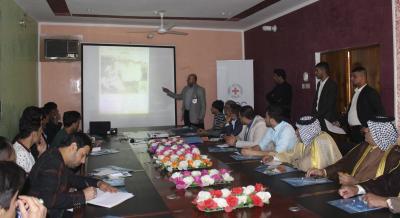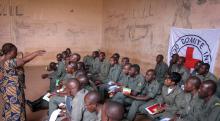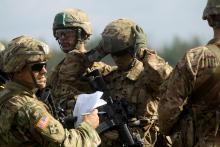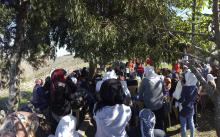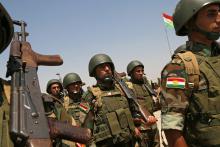Case prepared by Clara Delarue, Ana-Paula Ilg, Claudia Langianese, Eleanor Umeyor, LL.M. students at Roma Tre University under the supervision of Giulio Bartolini (IHL Professor), Tommaso Natoli and Alice Riccardi (Research assistants), Roma Tre University IHL Legal Clinic.
A. TRAINING KURDISTAN REGION’S ARMED FORCES ON COMPLIANCE WITH INTERNATIONAL HUMANITARIAN LAW
MERI [Middle East Research Institute] and Geneva Call have now initiated an ambitious training programme for high-ranking Peshmerga leaders who are currently actively engaged in the war against ISIS, on compliance with International Humanitarian Law (IHL). In collaboration with the Ministry of Peshmerga, the first of a series of workshops was held on Sunday, February 29th, 2016, with active participation of the representatives of the European Union Humanitarian Aid and Civil Protection department, the International Committee of the Red Cross, the United Nations Office for the Coordination of Humanitarian Affairs, as well as the military advisers from the leading countries of the international coalition and diplomats.
At the meeting, it was emphasised that the KRG [Kurdistan Regional Government] has not in any way adopted a structural policy aimed at addressing the violation of the principles of IHL. As well, it was stressed that when violations do occur they are of individual nature, not the result of any governmental policy. It was proposed that the Ministry of Peshmerga sign a memorandum of understanding with both MERI and Geneva Call, and that the three organisations take the lead in an initiative aimed at raising awareness of the norms and principles of IHL at all levels of Peshmerga forces; developing comprehensive mechanisms and policy recommendations that support compliance with IHL; and demonstrating the Peshmerga’s commitment to protecting fundamental human rights during times of war.
There are currently seven countries training the Peshmerga forces in combat, which includes elements of IHL. Any attempt to improve the respect for IHL principles must therefore be coordinated with other relevant actors. Geneva Call plans to expand on current efforts with a large public awareness campaign titled “Fighter not Killer,” featuring television and radio spots, a mobile phone application, media training, and the dissemination of various publications including, leaflets, brochures and booklets. Publications have and will continue to be distributed among commanders and soldiers at middle to lower ranks. It was also recommended that the programme focus not only on the Peshmerga, but other armed and security forces, including the Asayish (internal security force).
B. UPON MERI & GENEVA CALL’S RECOMMENDATION: PESHMERGA’S COMPLIANCE WITH INTERNATIONAL HUMANITARIAN LAW ENFORCED
A new decree from the Presidency of the Kurdistan Region was issued to enforce the compliance of Peshmerga forces with International Humanitarian Law and for the protection of civilians during conflict. This came following a policy recommendation by the Middle East Research Institute (MERI) and Geneva Call, who jointly held a series of workshops for the Peshmarga commanders, in collaboration with the Ministry of Peshmarga (MoP).
The new decree, signed by the Chief Commander of Peshmerga Forces, Massoud Barzani, was announced by the MoP’s Secretary General, Jabar Yawar, on the 30th May, during a workshop attended by the chief of staff of the Peshmerga forces and his deputies, senior commanders from the MoP, coalition forces’ military advisors, representatives of the European Union Humanitarian Aid and Civil Protection department.
Mr Yawar emphasized that a.) the decree urges the Peshmerga commanders across all the fronts in the fight against ISIS on compliance with the norms and principles of International Humanitarian Law, adherence to the rules of engagement and protection of civilians; and b.) the Peshmerga forces will need to receive adequate training and education on these issues, for which the MoP has approached other human rights and international organizations.
The MoP is aware of the importance of adherence to these laws and principles, and has cadres in each unit trained by international organizations – including the Red Crescent. The Ministry has also created a committee to amend the existing laws (19, 33, and 34) and has sought internal and external expertise to study these laws before introducing the amendments. However, the need for a structured and robust way of ensuring adherence to IHL has compelled the MoP to seek support from institutions such as MERI and Geneva Call.
The MERI-Geneva Call workshops were designed to identify gaps and obstacles within the training and conduct of the Peshmerga forces on the frontline and in conflict areas. Despite the fact that the armed forces are involved in a very tense conflict, they are required to make moral decisions. The Peshmerga must adhere to international law and standards by establishing extensive rules of engagement; building trust among the locals in the conflict zones and creating a mechanism to hold accountable those individuals responsible for violations.
Moreover, MoP officials also requested that MERI, in collaboration with other relevant organizations including Geneva Call, sign a memorandum of understanding with the Ministry and help with preparing a training program for the Peshmerga; formulate rules of engagement in compliance with IHL; create appropriate literature in Kurdish for disseminating those rules among the Peshmerga.
The workshop emphasized that even though the MoP has a special committee to supervise the frontline and follow up with claims and allegations, which consists of representatives of the judicial system, external monitoring is necessary, the Ministry must monitor and evaluate the implementation of policies and deal with any complaints that might arise as a consequence of war.
C. IRAQ: TRAINING A KURDISH ARMED NON-STATE ACTOR’S COMBATANTS ON THE LAW OF WAR
In November 2015, over two days, Geneva Call held its first training session for combatants since it reopened its programme in Iraq. Twenty fighters from the Kurdistan Freedom Party (PAK)–an Iranian Kurdish armed non-State actor (ANSA) involved in the current fighting–were trained on the Deeds of Commitment and the law of war (humanitarian norms).
[…]
This training session follows a dialogue initiated with PAK in 2014 and which led to this armed movement signing all three of Geneva Call’s Deeds of Commitment — protecting children in armed conflict, prohibiting sexual violence and against gender discrimination, and banning anti-personnel mines — in June 2015.
As agreed with PAK’s leaders in the implementation plan, this session’s goal is to train a number of rank-and-file fighters in order to increase the dissemination of the rules contained in the Deeds. Our training team comprises a legal adviser and a programme officer. The following day’s session will cover the dissemination of the law of war (humanitarian norms).
Although PAK is originally from Iran, it is now based in Iraq, and its operations are focused on the fight against the Islamic State group (ISg) alongside Kurdistan Regional Government forces, the Peshmerga. According to PAK, around 600 of its combatants are fighting in the Kirkuk area, with more around Mosul.
[…]
Protecting children in armed conflict
We start the training with the Deed of Commitment protecting children in armed conflict, and we discuss all its obligations. By asking the participants a few questions, we determine that all of them joined the PAK when they were over 18 years old. Their ages now range from 19 to 42.
[…]
Banning anti-personnel mines
Although we know that to date the PAK has not been reported as a user of anti-personnel mines, we review all the obligations of the Deed of Commitment, which include the prohibition of the use, development, production, acquisition, stockpiling, retention and transfer of mines and victim-activated improvised explosive devices (IEDs).
[…]
Prohibiting sexual violence and ending gender discrimination
We remind them that sexual violence is not just rape but includes other acts of sexual nature, such as sexual torture, forced abortion, trafficking for sexual purposes, forced nudity and so forth.
[…]
To conclude the day’s sessions, we distribute more than 100 illustrated booklets and posters on the law of war and the Deeds of Commitment that will be disseminated within their respective units. We also discuss the enforcement mechanisms in place for the three Deeds and underline the importance of continuing the dissemination of the rules to all their fighters.
[…]
D. PESHMERGA: ‘WE MUST UPHOLD OUR VALUES AND PROTECT CIVILIANS IN DEFEATING DAESH’
[…]
The Kurdish government recognizes some of the challenges in retaking areas from ISIS. In May 2016, President Masoud Barzani issued Presidential Decree No. 3 ordering all forces of the Kurdistan Regional Government (KRG) to adhere to international humanitarian and human rights law regarding the protection of civilians and their property. The ICRC began international humanitarian law trainings to the Peshmerga forces.
In August 2016, the Ministry of Peshmerga approved CIVIC’s [Center for Civilians in Conflict] proposal to train the Peshmerga in civilian protection. We began these trainings with the Peshmerga commanders in charge of units likely to be involved in the liberation of Mosul and the surrounding villages shortly after. Our training module, Protecting People and Communities During Operations, reflects the legal, ethical, and strategic reasons to protect civilians and their property. We discuss community engagement and how to address challenges in distinguishing between civilians and combatants. We also discuss why it’s important to assess the impact of operations on civilians and how to conduct those post-operation assessments. Finally, we stress the importance of acknowledging civilian harm when it does occur. (CIVIC eventually plans to begin similar dialogue on civilian protection with Iraqi Security Forces.)
[…]
E. IRAQ: ITALIAN ARMED FORCES TEACH INTERNATIONAL HUMANITARIAN LAW CLASSES TO KURDISH SECURITY FORCES
[Source: ONU Italia, “Iraq: Italians teaching international humanitarian law classes to Kurdish Security forces”, 12 December 2016, available at: Link not available.]
ERBIL, December 12 – As part of the Italy’s training of the Security forces of Kurdistan (KSF), the legal advisor of the Italian contingent in Iraq gave a lecture on international Humanitarian Law and Law of armed conflict.
Topics ranging from lawful combatants and war criminals to obligations and customs of war were touched. Some Peshmerga who have already fought against Daesh joined the classes.
International Humanitarian Law was established as such in the nineteenth century, but its principles are found in the scriptures of many religions – a set of rules which to comply to, whose violation might equal war crimes.
As an answer to violations committed by Daesh, the necessity to comply to the rules of humanitarian law is strongly felt by Kurdish security forces, especially by the Peshmerga who lost relatives in the fight against terrorism.
With 950 men and women, Italy is currently the second largest contributor to the US-led coalition in the fight against Daesh. Italian soldiers and Carabinieri have already trained over 13,000 men and women in Iraqi Kurdistan and Baghdad.
Discussion
I. Classification of the situation and applicable law
1. How would you classify the situation in Iraq in 2016 involving ISIS? What additional information would you need in order to make such a determination? Are the status of “autonomous region” of the Iraqi Kurdistan and the self-denomination of the “Islamic State” relevant in this regard? (
GC I-IV, Art. 3)
II. IHL Dissemination
a. (Documents A, B, C, D and E) What actors were involved in the training of the Peshmerga soldiers? What is their status? Do the ICRC and other humanitarian organisations have a legal mandate to undertake IHL dissemination activities? What could be the added value to joint efforts in such scenarios?
b. (
Document E) Was Italy bound by the obligation to disseminate IHL in Iraq? Could those trainings be considered as an interference toward the State’s internal affairs if there was no consent given by Iraq for such activities? (
GC I-IV, Art. 1)
4. (Document C) What positive aspects can be identified by the signing of unilateral declaration for the compliance with IHL by parties to armed conflict? What is the legal status of such deed of commitments? Are such endorsements important for IHL dissemination?
III. Elements contributing to respect for IHL
5. (Document B) Do you think that the parties to the conflict have a military interest in training their armed forces on IHL? Can such trainings contribute to maintenance of military discipline within the armed forces?
6. Can domestic and international pressure play a role in incentivising the parties to the conflict to comply with IHL? In your opinion, why did Italy and others in the US-led coalition invest in training the military of various actors in Iraq? Do you think that the involvement of the coalition partners can have a positive impact on the compliance with IHL by a party to the conflict?
7. (Documents B and F) Does the 2016 decree signed by the President and Chief Commander of Peshmerga Forces have an impact on the dissemination and respect of IHL? Why? What is the legal status of such document?
8. (Documents A and B) Why do you think that Peshmerga authorities welcomed and positively supported the dissemination activities carried out by external organizations? What advantages can military and political leaders identify in the performance of IHL by subordinates?

